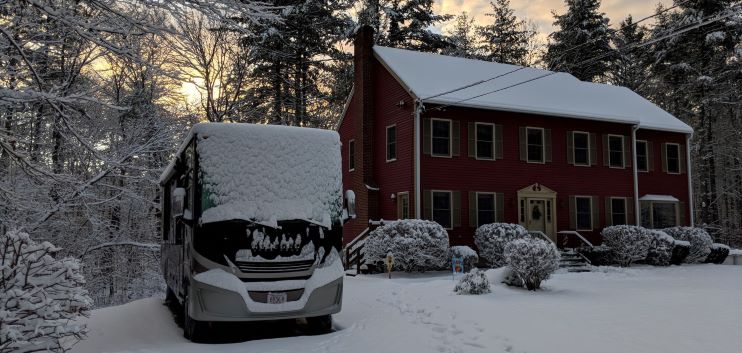By Steve Froese, F276276
It has been a very difficult year and a half. My family has not been able to travel for most of that time, and we have been unable to travel into the United States at all. The U.S. is our favorite RV destination for short jaunts as well as longer vacations. With COVID-19 restrictions starting to loosen, we have been able to take some short trips, and we are certainly looking forward to longer trips, especially into the United States. However, our travel window is shortening with fall upon us and winter on the horizon.
While the winter weather in our hometown of Vancouver, British Columbia, is generally not as snowy as the rest of Canada, and the temperature rarely dips much below freezing, it does tend to get a little cold and miserable. We keep our RV insured year-round, and we occasionally winter camp. However, at this time of year, it is important to start thinking about storing the RV for the winter. Depending on how often you use your RV and the climate you live in, winter storage may or may not be an issue. If you live in a colder climate and don’t use your RV full-time during the winter, it’s important to make sure it is properly prepared.
Many articles detailing the plumbing winterization process can be found online, including several of my own, so I will not cover that type of detail in this article. However, successful winterization goes beyond that, and sometimes issues that should be addressed are overlooked.
Batteries: If you plan to have your RV plugged into shore power while it is in storage, you can leave the batteries in place to charge. However, it is very important to clean the batteries and terminals and to ensure the electrolyte level is full in each cell. Also, check the battery condition monthly, including the electrolyte level; top off as necessary. If your RV is not going to be plugged in, I suggest removing the batteries, cleaning them, filling the cells, and fully charging them. Store in a cool, dry place. If you have solar panels, don’t rely on them to keep the batteries charged over the winter.
Humidity: If you live in a humid area, consider placing dehumidifiers in the unit. These are available in both electric and standard desiccant models. If you use the latter type, it is important to regularly replace the crystals and drain the water from the collection pan.
Engine: Add fuel stabilizer to motorhome and auxiliary generator engines, but note that diesel and gasoline fuel stabilizers are not the same. Engines and chassis should be serviced annually, and many owners choose to do this either before putting their RV into winter storage or during the spring shakedown. For extended storage, drain the oil from the generator, remove the spark plugs, pour a spoonful of engine oil into each cylinder, and replace the spark plugs. Don’t forget to replace the oil before starting the generator in the spring. Make sure your antifreeze concentration is sufficient to avoid engine damage.
Tires: Try not to leave your RV parked on dirt, as this can damage the tire material. Concrete, wood, or gravel are much better alternatives. And many owners choose to place a wood or rubber barrier between their tires and those surfaces. Just make sure that the tire surface rests completely on the barrier and is not hanging over. Be sure to move the RV a few feet every few months to avoid creating flat spots on the tires. Some owners like to extend the leveling jacks to help take a bit of weight off the tires. This applies only to leveling jacks and not stablizers. Plus, the vehicle needs to be on level ground, and tires should not be lifted off the ground completely.
Clean: It is a good idea to wash the RV, clean the inside, and do a sealant check before putting the unit in storage. Remove all perishables and other items that may attract rodents. Check on the RV periodically and inspect the floors, carpets, cupboards, drawers, and basement storage for signs of rodent infestation. If you find any, take action immediately to remove the critters. You may even choose to place traps when you put the unit in storage. If so, be sure to check them regularly. If you have an RV cover, place it over your unit. Do the same with tire covers.
Snow: Snow loading may be an issue to consider. If you experience wet, heavy snow in your area, consult with a contractor to periodically clean the snow off your RV roof. Do not attempt to mount a snow-covered roof yourself!
You may have your own winter RV storage traditions, and there are other tasks that some owners perform, but the tips provided here will help protect your RV over the winter.

